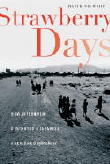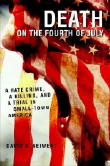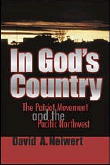Spyhopping the Right.

David Neiwert is a freelance journalist based in Seattle. He is the author of Strawberry Days: How Internment Destroyed a Japanese American Community (Palgrave/St. Martin's Press, June 2005), as well as Death on the Fourth of July: The Story of a Killing, a Trial, and Hate Crime in America, (Palgrave/St. Martin's, 2004), and In God's Country: The Patriot Movement and the Pacific Northwest (1999, WSU Press). His reportage for MSNBC.com on domestic terrorism won the National Press Club Award for Distinguished Online Journalism in 2000. His freelance work can be found at Salon.com, the Washington Post, MSNBC and various other publications. He can be contacted at dneiwert@hotmail.com.

Sara Robinson has worked as an editor or columnist for several national magazines, on beats as varied as sports, travel, and the Olympics; and has contributed to over 80 computer games for EA, Lucasfilm, Disney, and many other companies. A native of California's High Sierra, she spent 20 years in Silicon Valley before moving to Vancouver, BC in 2004. Her lifelong interest in the social effects of authoritarianism have most recently led her to pursue the MS in Futures Studies at the University of Houston. She's also a student member of the Association of Professional Futurists, and member of the Accelerated Studies Foundation advisory board on social and cultural issues. For fun, she raises kids and travels. You can reach her at srobinson@enginesofmischief.com.
Sara's recent series:
Cracks in the Wall: Parts I, II, and III.
Tunnels and Bridges: Parts I, II, III, and IV, plus a Short Detour.
Dave's recent series:
The March of the Minutemen
Intro: Parts 1, 2, 3, 4, 5, and 6.
Unhinged: Unhonest
Parts 1, 2, 3, 4, 5, and 6.
___
Other books by Dave [limited availability]:


"The Rise of Pseudo Fascism": An essay
Available in Adobe PDF format here
Support independent journalism:
Suggested $5 donation

Original posts: Part 1, Part 2, Part 3, Part 4, Part 5, Part 6, and Part 7.
______
Choice essays:
____
"The Political and the Personal"
____
"Bush, the Nazis and America":
Parts 1, 2, 3, and 4.
_______
Rush, Newspeak and Fascism: An Exegesis
[PDF file]
[Suggested $5 donation]
[In HTML: Parts I, II, III, IV, V, VI, VII, VIII, IX, X,, XI, XII, XIII, XIV and XV. See explanatory note.]
[Also available in HTML, and with art, at Cursor.]

_______
Orcinus Principium No. 1
Orcinus Principium No. 2
Why Orcinus?
|
|
| |
|
|
| |
|
|
|
|
|
|
| |
Another right-wing terrorist?
Thursday, June 05, 2003
Here's a decidedly unnerving story that underscores, once again, the potent threat of "lone wolf" terrorists of both the radical Islamist variety and the American right-wing variant. From the Associated Press:
Bomb plot suspected in LA stashes of weapons, ammo, jet fuel
- MONTEREY PARK, Calif. - A man now in prison for vehicle theft is believed to have been planning a significant attack on a building or people, say authorities who uncovered an arsenal of semiautomatic assault weapons, ammunition, pipe bombs and barrels of jet fuel.
There have been no charges filed involving the materials but the federal Bureau of Alcohol, Tobacco and Firearms is investigating, authorities told a news conference at Los Angeles County Sheriff's Department headquarters here Wednesday.
The man, John Noster, 38, has refused to talk to investigators, sheriff's Sgt. John Demooy said.
"He was definitely planning on targeting a structure, location, individuals, and would have created significant damage," Demooy said.
Authorities, however, have not been able to identify the target.
Note that Noster was a "white collar professional" who was far from the stereotype of the uneducated camo-geared beer-bellied militiaman. Also, there's this:
- Investigators also found a list of apparent titles including "None Dare Call it Conspiracy," "The CFR," "The Invisible Government," "Secrets of the Federal Reserve" and "Shadows of Power." Books by those names allege a worldwide socialist conspiracy of bankers, government leaders and others.
It is, once again, fortunate that good luck and smart work by law enforcement caught this guy before he could carry out his attack. There have been other similar cases. Two spring immediately to mind: the arrest of Bradley Glover and his gang, for instance, before they could pull off their plan to attack a military base (they were en route and had some serious materiel); the arrest of the militiamen who were planning to blow up a propane facility in northern California, with potentially catastrophic results.
Of course, those cases didn't exactly make the evening news, either.
10:59 PM
Spotlight
Intelligence and the lack thereof
An important read, from Jim Lobe at Foreign Policy in Focus:
Credibility Gap over Iraq WMD Looms Larger
- Retired intelligence officials from both the CIA and the DIA are also coming out with ever-stronger statements accusing the intelligence community of twisting and exaggerating the evidence to justify war. They say both agencies were intimidated by the political pressure exerted in particular by neoconservative hawks under Cheney and Rumsfeld, who even established a special unit in the defense secretary's office to determine what intelligence was "missing."
Much of the evidence on which the WMD case was based came from defectors supplied by the Iraqi National Congress (INC), an exile group headed by Ahmed Chalabi that has been championed by the neoconservatives--including Deputy Defense Secretary Paul Wolfowitz, Cheney chief of staff I. Lewis Libby, and Defense Policy Board members Richard Perle, Kenneth Adelman, and James Woolsey--for more than a decade.
The disturbing aspect of this is that this lousy, agenda-driven intelligence also formed the basis for the administration's current strategy for rebuilding Iraq, which as you may have noticed is not exactly going according to plan.
[Also worth reading from the FPIF site: The U.S. and Post-War Iraq: An Analysis, by Stephen Zunes.]
9:46 PM
Spotlight
An Identity tutorial

Just in time for those wanting to know more about Christian Identity and its origins, here's a nifty slide show from my friends at Political Research Associates:
Christian Identity: A Bibliographic Genealogy
9:20 PM
Spotlight
What terrorists?
Here's an interesting response to the Eric Rudolph arrest, from the Cincinnati Enquirer:
Don't rush to conclusions
- No sooner had Rudolph been nabbed Saturday in Murphy, N.C. than he was being identified in the media as a "Christian terrorist" -- a shocking buzz phrase that is all but meaningless, although at least it may be giving Christians an inkling of how Muslims feel when news accounts refer to "Islamic terrorists."
Rudolph allegedly has ties to the radical Christian Identity movement and its violent Army of God offshoot. We don't know if Christian Identity truly reflects Rudolph's beliefs or merely became a convenient vehicle for him. But the easy generalization is to paint all conservative fringe religious groups as violent -- even though the pastor of a church Rudolph attended as a youth insists his sect teaches non-violence.
Either this editorialist is naive beyond belief (a common trait of mid-level editorial writers, actually) or purposely disingenuous. The Identity pastor to whom he refers (Dan Gayman) of course will claim he teaches non-violence, even though his frequently apocalyptic pronouncements border on outright incitements. Moreover, the ideology he preaches incites racial hatred; from it, a teenager like Rudolph naturally fell in with other Identity believers -- the Hayden Lake sort, who actually dominate the movement -- because Gayman himself associates with them. (See the ADL's rundown on Gayman, obliquely overlooked by both the Enquirer editorialist and the Washington Post reporter from whom he obviously cribbed his notes; observe, e.g., that he duplicates the Post's factual error about the Army of God being an Identity offshoot.) Ultimately Rudolph's chief mentor was another Identity preacher, Nord Davis, who in fact does preach a doctrine of violence and "lone wolf" terrorism.
These facts are readily available. But just as it's easy to lump mainstream Christians in with extremists, it's also easy to dismiss the ramifications of the associations with oversimplified whining. The latter only evades the responsibility on the part of serious Christians (I consider myself one) to stand up and make the distinction between Identity and mainstream Christianity clear. And rather than take on this responsibility, the editorial runs the other direction:
- Rudolph's arrest also revived some ugly regional stereotypes. The thinking goes that he couldn't have eluded capture for so long without plenty of aid and comfort from the community in rural western North Carolina -- which has yet to be proven -- and that people in that religiously conservative region tend to agree with the bomber's twisted thinking.
But the signs and bumper stickers in support of Rudolph were meant more to mock authorities' inability to catch him, not endorse the violence he is accused of, residents told the Associated Press.
Regardless of its intent, those signs in fact minimized the harm that Rudolph wreaked by rendering his victims nonentities. One of those victims was a policeman, remember. Moreover, the editorialist at this point is bending over backwards to exonerate Rudolph's supporters of anything untoward.
As Travis Gettys, who brought this to my attention, observes trenchantly, this editorial amounts to "an apology for those who allegedly gave support to Eric Rudolph. For an editorial staff who decry any legitimate criticism of 'the authorities' -- particularly police -- they seem to take a different attitude toward these authorities tracking down an accused cop killer. I guess, to them, it's different if the cop was killed while providing security at an abortion clinic."
[Thanks to Travis for the link.]
9:05 PM
Spotlight
Great reading
My favorite new blog by a journalist:
Back In Iraq 2.0
Being the work of Christopher Allbritton, yet another renegade journalist after my own heart. Be sure to chip in at the contribution button.
[Many thanks to Margaret in NY for the heads-up.]
8:23 PM
Spotlight
Eric Rudolph and the face of terror
Wednesday, June 04, 2003
The arrest of Eric Rudolph has made for some interesting stories afterward. I especially was interested in the New York Times piece about the local reaction to the arrest, which opened with this nugget:
- "He's a Christian and I'm a Christian and he dedicated his life to fighting abortion," said Mrs. Davis, 25, mother of four. "Those are our values. And I don't see what he did as a terrorist act."
Coming from the mouth of someone who lives in a backwater, this kind of sentiment sounds like something from Deliverance. But Davis in fact was expressing a view not far from that voiced by prominent Republicans in key positions.
Rep. Porter J. Goss, R-Florida and chairman of the House Permanent Select Committee on Intelligence, said more or less the same thing during hearings on the Sept. 11 attacks.
"The trouble is, 'terrorism' is a very broad word, and it lends itself to a lot of mischief for people who would abuse common sense," Goss said. He then cited bombings of abortion clinics. "To me, that's not the kind of terrorism I'm talking about."
"That's criminal law enforcement," Goss said. "But it would fit most broad definitions of terrorism because the purpose [of those attacks] is to scare people."
Fortunately, the Justice Department has not taken this route in its dealings with right-wing terrorism. For the most part, it has taken on home-grown rightist extremists with more vigor than anyone might have expected, given who is running the department (Rudolph's non-arrest having formerly been the main bit of evidence to the contrary). See, for instance, the following report in the Washington Post:
Tracking Hate Groups Aids Terrorism Fight
- Even as dismantling al Qaeda remains the clear priority of terrorism task forces, agents have been ordered to be vigilant about domestic groups. "The focus on international terrorism is obvious, but September 11th has made us examine all security issues," a law enforcement official said. "You can't make the number one goal preventing attacks against the U.S. and not look at a danger that could be posed here at home."
The terrorism task forces are homing in on all groups, including militia movements and even environmental and animal rights organizations.
But the efforts have had the greatest impact on neo-Nazi and white supremacist groups. In recent months, prominent white supremacists have been indicted in several states, including Pennsylvania, Georgia and Washington, and news of their arrests has resulted in a frenzy of anti-government exchanges on neo-Nazi and other racist Web sites.
Rudolph's arrest, along with the conviction of doctor-killer James Kopp, mark important steps in the progress made by law enforcement in keeping these kinds of extremists in check. But the problem may be moving beyond the point where law enforcement can make a difference.
Consider, for instance, the content of Ms. Davis' remarks, particularly the associations she makes between Christian Identity -- which is the core of Eric Rudolph's belief system -- and mainstream Christianity. If ever there was a boundary there, in her eyes it has been eradicated. And the more we see this kind of worldview become common, the more trouble we are in as a nation.
For most of the history of Christian Identity (its origins stretch back to the turn of the previous century), its beliefs -- which are that white people are the true children of Israel; that Jews are Satanically descended (or inspired) pretenders to the title; and that the rest of humanity is comprised of soulless "mud people" -- have been widely denounced as a heresy. Even the most conservative fundamentalists -- whose doctines of scriptural inerrancy certainly are an important component of Identity, though interpretations obviously differ, and whose cultural conservatism on racial and other issues forms a common ground -- have considered Identity anathema.
The problem appears in other forms. Consider this story from the Washington Post:
Is Terrorism Tied To Christian Sect?
Even though this article raises an important question, it is somewhat problematic. For starters, there's an important factual error, where the reporter (Alan Cooperman) refers to the Army of God as "a violent offshoot of Christian Identity." There is, as far as I know, no substantial connection between Identity and the AoG, which is strictly focused on the confrontational and violent approach to stopping abortion, an agenda which has only an intersection (the abortion of white babies) with Identity.
Even more important is the very phrasing of the question in the headline: It identifies Christian Identity with Christianity in general. And knowing Michael Barkun, I am fairly confident that he too pointed out that calling Rudolph a "Christian terrorist" is something of a misnomer, since Barkun knows better than anyone the gulf between Identity beliefs and mainstream Christian theology.
Cooperman's story does make this point, quoting my friend Jim Aho:
- Another expert on such groups, Idaho State University sociology professor James A. Aho, said he is reluctant to use the phrase "Christian terrorist," because it is "sort of an oxymoron."
"I would prefer to say that Rudolph is a religiously inspired terrorist, because most mainstream Christians consider Christian Identity to be a heresy," Aho said. If Christians take umbrage at the juxtaposition of the words "Christian" and "terrorist," he added, "that may give them some idea of how Muslims feel" when they constantly hear the term "Islamic terrorism," especially since the Sept. 11 attacks.
"Religiously inspired terrorism is a worldwide phenomenon, and every major world religion has people who have appropriated the label of their religion in order to legitimize their violence," Aho said.
This becomes a serious problem when the boundaries between the mainstream religion and the extremists begins to be erased. Sometimes this is done intentionally, especially by Identity folk like Rudolph; sometimes it is done unintentionally, by simple thinkers like Ms. Davis; by politicians like Porter Goss; and by media folk looking for a smart angle and coming up with an old tire.
What Eric Rudolph reminds all of us is that extremist believers like himself do not have to be numerous to wreak a whole lot of damage. This is true of terrorists of all stripes. Consider, for instance, this piece from the Christian Science Monitor, just before Rudolph's arrest:
'Lone wolves' pose explosive terror threat
This article is primarily about Islamic lone wolves -- the stray actors who in many ways pose one of the most potent terrorist threats, because they are so hard to detect and can wreak considerable havoc. It only lightly touches on the fact that this very strategy is one that has become a favorite of the extremist right in recent years, with acts running from Buford Furrow's rampage in Los Angeles and Benjamin Smith's killing spree in the Midwest.
Eric Rudolph, in fact, is a classic case of a "lone wolf" terrorist. Keep in mind that among the main proponents of this kind of terrorism was Nord Davis, the Identity preacher who was Rudolph's mentor:
- But throughout, he emphasized the power of the lone wolf -- the unaccompanied terrorist who, like Davis’ follower Rudolph, would act without aid from others.
"America will not be saved by organizations or groups," he wrote in 1990. "If you ... study what happened in the South after the War Between the States, you will see how America will be saved again. ... Small groups, known by the Socialist traitors ... as the ‘invisible empire,’ will meet and work in secrecy and high security, and quietly eliminate the problem people. ...There will be no unified command structure between the various groups so any infiltration will be both expensive and time consuming."
Though I think there's little question that right-wing extremist groups have been in serious decline in very recent years, that is more or less in keeping with its traditionally cyclical nature. More to the point, the tightening circle of true believers also tends to amplify the potential for some of them to spiral off into violence. And as Rudolph or Tim McVeigh showed us, it only takes a few of them to wreak a hell of a lot of havoc.
Robert Wright made this point in his superb Slate series, "A Real War on Terrorism:
- For the foreseeable future, smaller and smaller groups of intensely motivated people will have the ability to kill larger and larger numbers of people. They won't have to claim that they speak on behalf of a whole religion. They'll just have to be reasonably intelligent, modestly well-funded, and really pissed off. It may be hard to imagine a few radical environmentalists, or Montana militiamen, or French anti-globalization activists, or Basque separatists, or Unabomber-style Luddites, killing 100,000 people. Yet what makes this plausible is exactly what makes radical Islam such a formidable long-term threat: two enduring aspects of the evolution of technology [namely, the growing accessibility of massively lethal munitions, and the diverse threat posed by information technology].
Concurrently, leaders of extremist factions have been fairly explicit in advocating "piggyback" terrorism that seeks to increase the levels of chaos in conjunction with international terrorism. Consider, for instance, a couple of William Pierce's post-Sept. 11 remarks.
From a radio address: "Things are a bit brittle now. A few dozen more anthrax cases, another truck bomb in a well chosen location, and substantial changes could take place in a hurry: a stock market panic, martial law measures by the Bush government, and a sharpening of the debate as to how we got ourselves into this mess in the first place."
In an essay on his Web site, Pierce declared that "terrorism is not the problem," going on to explain that the current threat is "the price for letting ourselves, our nation, be used by an alien minority to advance their own interests at the expense of ours" -- meaning, of course, Jews.
"Bombing the whole Middle East flat will not solve our problem," he wrote. "Our problem is here, not in Afghanistan or Iraq. What Osama bin Laden gave us on September 11 was just a wakeup call.
"What the people mailing out anthrax-infected letters are giving us is just a reminder that we can have no real security -- in fact, no real future for our children and our grandchildren -- until we regain control of our own government. Americans will never again have real security or real peace of mind until they have regained control of their government and their media."
It's important to consider that the still-unsolved anthrax attacks of October-November 2001 may well have been the work of a right-wing extremist -- perhaps not someone with any organizational connection, perhaps even an idiosyncratic type, but nonetheless with largely right-wing beliefs.
And when you consider that right-wing extremists have in fact been arrested for the anthrax hoax letters sent to abortion clinics in the same time period -- a clear-cut case of "piggybacking" -- I think it becomes clear that these extremists have not only the means but probably also the clear intention of amplifying any kind of terrorist attacks perpetrated by Al Qaeda. For that reason alone, they remain a very serious threat indeed.
This is not to minimize the threat posed by radical Islamic terrorists, of either the "lone wolf" or the organized kind. It should be clear after Sept. 11 that both their networks and their lone actors pose a much more imminent and potent threat regarding mass violence than do right-wing extremists (for one thing, I think they are considerably more competent, as a rule). This is especially the case when you consider that, theologically speaking, in Islam the barrier between radical theology and the mainstream has become increasingly obliterated, with major theological institutions actually producing some of the most radical ideologues.
This is has not been the case with Christianity to any appreciable degree. If the Islamists are to Islam as radical fundamentalists such as Identity are to Christianity (a reasonable analogy, in my view), then we have not seen the same kind of obliteration of the lines between them in the case of the latter as the former. Even conservative fundamentalists, as far as I know, continue to view Identity as a heresy.
The real danger thus comes when the lines between Identity and Christianity become blurred, as they have in the wake of Rudolph's arrest. This is not the first time this has happened, and it likely will not be the last. There remain important "danger zones," meeting areas of common ground between mainstream fundamentalists and radical ideologues, including "Dominion Theology" and the anti-abortion movement, that probably bear watching the closest.
Moreover, the reality is that there is not any serious danger of radical Islam itself overtaking the United States in any kind of foreseeable future, nor for that matter of radical Islam manifesting itself as a social/political movement in the USA to any real extent. Islamists will not be recruiting many followers in North America anytime soon.
Right-wing extremism, however, has at various times manifested itself as a popular social movement in America, and it has in the recent past exhibited an ability to recruit large numbers of people from the mainstream of the body politic. More to the point, it has exhibited a remarkable ability to inflict terrorist chaos that must not be underestimated.
Annually, right-wing extremists within our borders are responsible for a siezeable number of crimes. These range, as Mark Pitcavage of the ADL points out, from "bombings and bombing plots to assassination plots and murders to weapons and explosives violations to hate crimes to massive frauds and scams (amounting in some cases in the hundreds of millions of dollars) to the myriad of lesser crimes." Even if you totaled up several years' worth of criminal activity related to Islamic extremism, it would fail to come close to the levels produced by our own homegrown terrorists.
It is also important to keep in mind exactly what the long-term strategy of the extremist right is: To undermine the existing government and democratic institutions to as great a degree as possible by creating as much social chaos as possible. Terrorism is central to this strategy, because through terrorist acts like Oklahoma City, they intend to make the public come to believe that their government can no longer keep them safe. They then intend to present themselves as the "strong" alternative that will secure our borders, imprison the internal dissidents and make the trains run on time -- and although swelling their own ranks is key to this strategy, they do not intend to seize power by democratic means.
We may breathe a sigh of relief that at least one of these terrorists -- and one of the most troublesome -- is finally behind bars. But it is important to remember that there are others out there waiting to follow in his footsteps. And they may prove every bit as hard to bring to ground -- if not harder.
10:24 PM
Spotlight
Bush's historical revisionism
Sunday, June 01, 2003
Atrios at Eschaton wonders why Bush would say this when touring Auschwitz:
- At one point Mr. Bush turned to Ms. Swiebocka and asked, "Do people challenge the accuracy of what you present?" Mr. Fleischer, who was accompanying the president a few paces behind, said he could not hear the answer.
My answer: It's pretty clear that Bush -- who loves to make himself out a victim (of liberal bias) too -- asked the question because he sees himself in the same boat regarding his inability to prove that Saddam Hussein possessed biological and chemical weapons, the cornerstone of his rationale for invading a sovereign nation. Of course, without that rationale, Bush begins looking more and more like the international aggressor, not Hussein.
The difference is this: The evidence of the Holocaust is simply irrevocable. The evidence of weapons of mass destruction in Iraq is, evidently, unrecoverable.
Bush's tasteless willingness to play on the Holocaust imagery is particularly questionable, considering that his own grandfather was one of the great American capitalist contributors to the Nazi war machine. But this whole exercise was a gigantic public-relations gambit, intended to draw a clear parallel between Hussein and Hitler. It appears the Busheviks -- who are increasingly unpopular around the world -- are hoping they can pull the same bullshit over the eyes of the international community that they have with a substantial portion of the American public, not to mention the entire population of the punditocracy.
Unfortunately, Bush's analogy is not only ahistorical, it is every bit as revisionist as the kind of "Holocaust denial" as that practiced by the right-wing Institute for Historical Review and its sympathizers. Saddam was no Hitler. He was a tinpot who could barely run his own country.
And yes, Mr. Bush, people do question the accuracy of the recounting of the Holocaust. They are all on the right, and include such conservative stalwarts as Pat Buchanan. Indeed, one of their chiefs is a fellow named David Irving, who has been regularly defended by such ardent Busheviks as Christopher Hitchens.
They are liars. And so, I might add, are the politicians who led us to war by telling us Saddam had nukes.
10:46 AM
Spotlight
|
|
| |
|
|
|